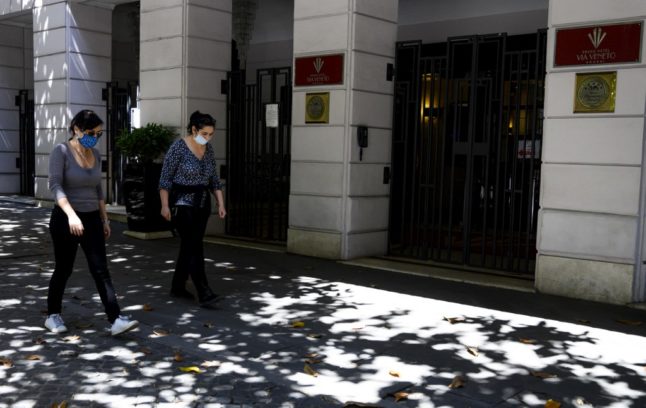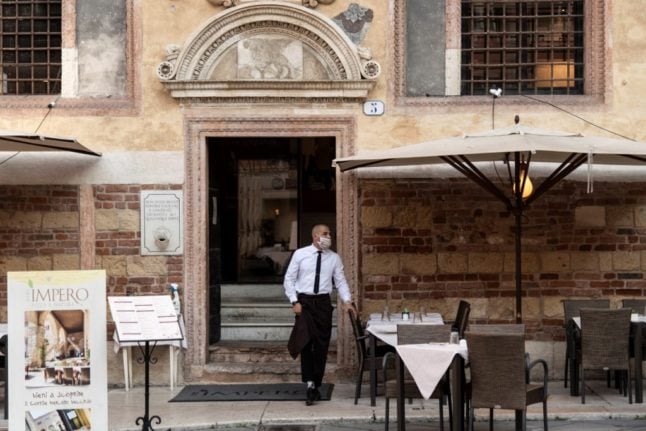Until recently, most people in Italy were hopeful, even confident, that the 2022 Easter holidays would mark the beginning of a return to normality and a much-awaited restart of the pre-pandemic way of life – from travel to family celebrations.
But judging from the latest reports from industry and consumer groups, this Easter will instead be marked by eye-watering price hikes for consumers and further financial woes for hospitality businesses.
Household budgets are being squeezed further this spring as prices rise amid the war in Ukraine and the ongoing impact of the pandemic.
Italian consumer rights group Assoutenti found recent double-figure price increases for goods such as butter, oil, flour, vegetables, and pasta in the shops mean making a home-cooked Easter dinner will cost an average of six percent more than last year, Ansa reports.
Furthermore, 76 percent of consumers have noticed a significant increase in food prices, with 48 percent already trying to slash their supermarket expenses by switching to cheaper options in their carts, according to findings from polling company Radar SWG.
The situation isn’t looking much better for those heading to a restaurant for their Easter lunch. SWG found 66 percent have cut their budgets for eating out, while menu prices are forecast to be 5 percent higher compared to last year.
READ ALSO: War and energy prices: Why the cost of pasta is rising in Italy
In some parts of the country the cost of the bill for a family meal out is set to increase by 10 percent, warned Italy’s National Artisans Union (Confederazione Nazionale dell’Artigianato), which represents craftspeople and small business owners.
If soaring restaurant prices seem to have already put many off eating out, sky-high fuel prices are expected to force many people to remain at home over the holidays.
With petrol being up by an average 12.2 percent and diesel being a whopping 22.7 percent dearer than last Easter, one in three have already decided against travelling over the holidays.
The Italian tourism federation (Federazione Italiana del Turismo) said the government’s ’30 cents per litre’ fuel discount hasn’t produced the expected results.
The Federation’s president, Vittorio Messina, told La Repubblica: “Expectations for springtime tourism were very high. However, the recent increase in fuel prices has a bearing on the overall cost of travelling, and Italians, who have already been hit hard by the hike on household bills, have naturally decided to resize their budgets.”
READ ALSO: Will tourism in Italy return to pre-pandemic levels this year?
Such budget cuts are expected to place further strain on the ailing Italian hospitality industry.
Hotel bookings across the country are presently down by 30 percent compared to last year, and big cities are once again being hit the hardest, tourism industry groups warned.
In Rome alone, the number of bookings over Easter is nearly half of what it was in 2019 and a whopping 250 hotels are currently closed in the city.
Milan doesn’t fare any better. “Out of 30,000 available hotel rooms, only 6,000 are currently booked,” said the president of Italian hoteliers’ association Federalberghi, Maurizio Nano.
“That is roughly 20 percent. This time two years ago, bookings were around 75 percent of the overall capacity.”

The ongoing war in Ukraine has considerably aggravated the situation. “From the start of the war, we’ve had plenty of cancellations,” said Giuseppe Roscioli, from Federalberghi Roma e Lazio.
Unfortunately, Federalberghi warned, the conflict has not only curbed tourism from Russia and Ukraine but has also prompted travellers from Northern and Eastern Europe to change their plans. Many American nationals have also cancelled bookings since the start of the war.
If a drop in consumer spending has already delivered a blow to hotel managers, increased costs are threatening to put the industry on its knees.
Soaring gas and electricity bill not only mean households have less disposable income, but rising costs have forced many hoteliers to put up their prices.
READ ALSO: Rising energy prices: How to save money on your bills in Italy
So much so that, according to the latest data from Italian statistics bureau Istat, staying in a hotel or B&B is on average 8.4 percent more expensive than it was last year.
Rising accommodation prices might now make Easter travel inaccessible to many. According to a study by market research institute Demoskopica, travel will not be on the cards for 13 percent of Italian families this summer due to a worsening of their financial situation.



 Please whitelist us to continue reading.
Please whitelist us to continue reading.
Member comments